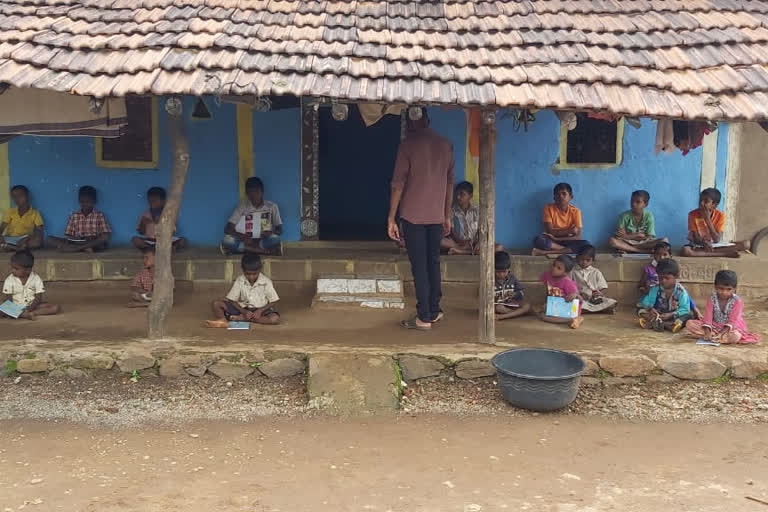Palghar: One overcast morning in a farming village in hilly western India, a group of school children sat on the mud floor of a wooden shed for their first class in months. There was no teacher, just a voice from a loudspeaker.
The recorded lessons form part of an initiative by an Indian non-profit spread over six villages that aims to reach 1,000 students denied formal classes since the coronavirus pandemic forced schools to close four months ago. This initiative was proposed by Digant Swaraj Foundation in the remote areas of Mokhada, Jawahar, Neelmati Dandwal and Mokhada taluka.
The programme named 'Bolki Shaala' has received a warm and encouraging response under which recorded lessons are played on loudspeakers. The volunteers have been assigned the task to carry loudspeakers through villages in Maharashtra. Children gather at designated, socially-distanced spots await the arrival of loudspeakers.
This comes in the backdrop of the deadly coronavirus outbreak, schools and educational institutions have shifted to the online mode of education but it remains a distant dream for many. But the digital divide in the country has not been successful in places which lack proper network services and high-speed internet connectivity.
The aim is to complete at least 20 per cent of the school syllabus and the group of students have been divided into three groups according to the different age groups. The school starts from 8 am and go on till 4 pm every day.
"At least children from 300 families participate in the online classes. We are striving hard to reach out to 1000 poor and underprivileged kids of the tribal regions," said one of the spokespersons of Diganta Swaraj Foundation.
The children sang rhymes and answered questions, with some of them speaking of the loudspeaker as 'Speaker Brother' or 'Speaker Sister'. "I love studying with Speaker Brother," said Jyoti, a gleeful 11-year-old girl who attended one session.
"We wondered if children and their parents would accept a loudspeaker as their teacher," said Shraddha Shringarpure, head of the Diganta Swaraj Foundation, which has done development work for more than a decade among tribal villages in the region.
But the response to the programme, called 'Bolki Shaala' or 'Spoken School' in the state language of Marathi, has been encouraging, Shringarpure added. It reaches children who are usually the first in their families to go to school, with content covering part of the school curriculum, as well as social skills and English language lessons.
Parents express gratitude
"These kids have no guidance from their family, they are on their own," Shringarpure said. While many children in cities have been able to attend classes online, those in places like Dandwal, where telecom networks are poor and power supply is often erratic, have gone months without opening schoolbooks.
Most of the families living in the villages have expressed their gratitude saying that with the commencement of 'Bolki Shala' children have started paying attention to studies. With students taking classes through 'Speaker Dada', kids now spent less time in roaming and wandering outside amid on-going pandemic.
Parents like Sangeeta Yele, who hope for better lives for their children, are pushing them to attend the mobile classes. "As the school is closed, my son used to wander in the forests," said Yele.
'Bolki Shaala' has reached our village and now my son has started studying. I am happy. It gives me happiness that my son can now sing songs and narrate stories."
Social distancing followed
Under the 'Bolki Shaala programme', social distancing norms are being maintained as only five students are made to sit on the verandah. All the health protocols related to COVID-19 protocols are being followed. Students have been asked to wash and sanitize their hands at interludes and follow all the necessary precautions.



